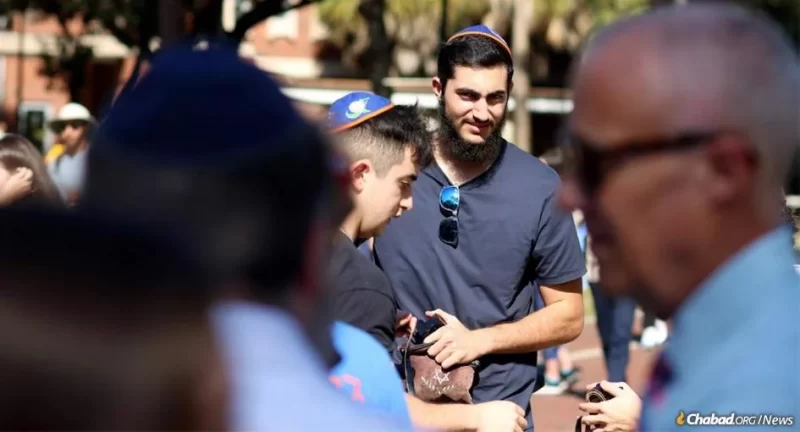
Tefillin Tables Combat Antisemitism on U.S. Campuses
by Karen Schwartz – chabad.org
When white supremacists mockingly set up a table at the University of Florida in Gainesville earlier this year after multiple antisemitic chalk-written messages began appearing on and off campus, a fearful feeling of “Can this be happening here?” was widespread in the Jewish community, especially among students. So was the outrage and condemnation expressed by Jews and non-Jews around the nation.
At the same time, the Lubavitch Chabad Jewish Student Center in Gainesville, led by Rabbi Berl and Chani Goldman, had an additional response that students say is even more effective than outrage.
An unprecedented number of Jewish male students began proudly and publicly donning tefillin at the longstanding table set up to help Jewish students and faculty to do mitzvahs and learn more about their heritage.
Jacob Stein, 21, who spent his freshman and sophomore years on campus before heading to Israel for a junior year abroad, says offering students the chance to put on tefillin and discuss Judaism in public settings has long been a meaningful expression of Jewish pride for students.
It’s a way of fighting darkness with light, he tells Chabad.org. “It wouldn’t make sense for us to hide or for us not to show ourselves proudly just because a tiny minority of bigots don’t respect what we do,” he explains. “Because there are many more people who respect what we do.”
Stein spent Friday afternoons for several years at the Chabad stand on the part of campus with the most foot traffic, offering students the chance to connect and get more involved with their Judaism through mitzvahs such as tefillin. For the most part, people were receptive, he says. “When they see us repping our Judaism positively and happily, they get inspired. They want to come to a Shabbat meal, learn more about Judaism, or just connect with other Jewish students.”

Destinations for Support and Security
The on-campus tables are a great way to reach students and faculty where they are—a place to stop between classes or on the way to the library, says Rabbi Aaron Notik, program director at the Gainesville Chabad Center. The tables are also destinations where Jewish students can find comfort and support.
“What we find is that especially when there’s tension, antisemitic events or things going on in Israel where the average Jewish student feels somewhat isolated or vulnerable, we find many more students than average will stop by. “It’s not just the young men who wrap tefillin, but young women who will stop by to pick up a kit for Shabbat candles or just to chat with the rabbi.”
Active whenever classes are in session, Notik says the table gives students a place to “exercise their Jewishness.” They’re able to perform a mitzvah,” he says. “In a very physical sense, it gives them the ability to demonstrate their pride and confidence in being Jewish.”
Since then, the use of tefillin soars whenever Israel is under attack. When schools and shopping centers were ordered closed in 2019 after terror groups in Gaza fired barrages of rockets at major population centers, additional public tefillin tables were set up at Chabad centers around the country so as many men as possible could perform the mitzvah. The presence of public tefillin stands around the country throughout the year is a practice that’s supported by Israelis across the religious and political spectrum.
The practice of helping other Jews don tefillin in public became widespread just ahead of the Six-Day War when the Rebbe—Rabbi Menachem M. Schneerson, of righteous memory—called for Jewish men and boys to put on tefillin in spiritual solidarity with those living in Israel and as an extra measure of spiritual security for Jews under attack.

A One-Stop Mitzvah Shop
Over the years, public tefillin stands have emerged around the world as a one-stop shop for Jews to perform mitzvot wherever they are, including on college campuses.
Avram Plager, 20, a junior at Texas A&M University in College Station, says having public tefillin wrapping and Jewish cultural events on campus is essential. “I think it’s a good thing for people to get an idea what Jewish culture is all about and ask questions about what Jewish values are,” he says. “ A lot of people have presumptions about what Jewish culture is, but they don’t really know. Having that publicity means we can explain to people what Judaism and Jewish culture is all about.”
Plager, who got more involved with Chabad spring semester of his freshman year, wraps tefillin because it’s a mitzvah and a reminder to prioritize being Jewish in his life. Wearing a kippah, he’s also visibly Jewish on campus. “It can get a little difficult,” he says of the public display. “But I feel like it’s been well-received.”
When students wear kippahs on campus, it instills Jewish pride, and tefillin is another element of that, says Rabbi Yossi Lazaroff, who directs the Rohr Chabad Jewish Center at Texas A&M. His Chabad has a table on campus when school is in session at least once a week, where students help other students wrap tefillin and connect with their heritage.
“It’s almost like office hours, where Jewish students can come by and get things related to upcoming holidays,” he says. “The purpose for putting tefillin on Jews is to empower them and strengthen their Jewish identity.”















